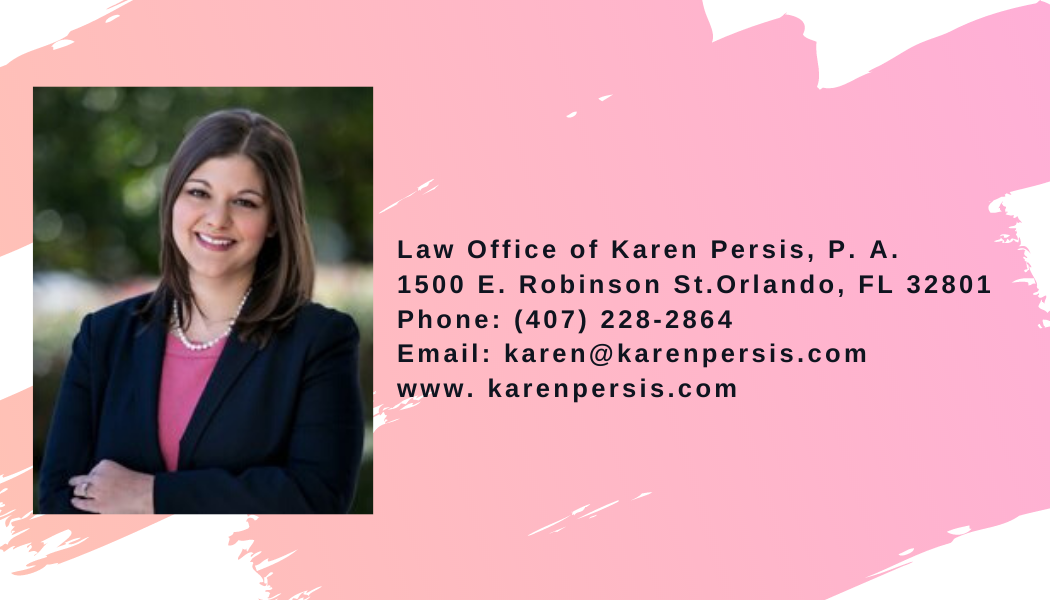Written by: Karen Persis
As an attorney who specializes in surrogacy in Florida, I have had the opportunity of representing many Intended Parents as well as Gestational Surrogates in the legal process. Frequently with Gestational Surrogates, their reproductive lawyer might be the first lawyer they have ever engaged for legal services. That might seem a little daunting or scary. This article can provide some guidance regarding the legal process in Florida, and hopefully answer some questions and calm any anxiety a Gestational Surrogate might have regarding the legal aspects of surrogacy.
Effectively, there are two legal phases involved in surrogacy: contracts and court. The contract phase will be a Gestational Surrogate’s first (and likely only, depending on the state) interaction with her attorney. It is typically completed prior to the Gestational Surrogate starting stimulation medication. The court phase may begin during pregnancy (depending on the jurisdiction) and will be completed post-birth.
When a Gestational Surrogate is medically cleared by the Fertility Clinic, the contract phase is ready to begin. She will sign some type of agreement or engagement letter with her attorney, and this document will include the scope of work involved and expectations regarding the representation. If the Gestational Surrogate is married, her spouse will be a part of the gestational surrogacy agreement, which means the spouse will also be represented by the Gestational Surrogate’s attorney. Anything the Gestational Surrogate and her spouse tell their attorney is protected by the attorney-client privilege unless they give permission to their attorney to reveal the information. This is important for the Gestational Surrogate and her spouse to understand – their attorney is working for them and their interests, and not the Intended Parents, the Fertility Clinic, or the agency.
The Intended Parent’s attorney will send a draft of the gestational surrogacy agreement to the Gestational Surrogate’s attorney for their review. This draft will have already been reviewed by the Intended Parents. The Gestational Surrogate’s attorney will then provide the draft to the Gestational Surrogate and her spouse, for them to read. Once they have had time to read, a call will be scheduled so that the Gestational Surrogate and her spouse can review the entire agreement with her attorney, and discuss any questions, changes, concerns, or even errors in the agreement. It is absolutely critical that the Gestational Surrogate and her spouse take the time to read the entire gestational surrogacy agreement, as well as any exhibits. While time is of the essence, these agreements are typically very long and rather verbose, and by signing the agreement, the Gestational Surrogate is committing herself and her family to a rather lengthy and important legal obligation. Reading every page is critical. Print it, read it, highlight, underline, make notes, and ask questions. The Gestational Surrogate’s review with her attorney is a critical time in the contract stage. Ask every question. No question is dumb. If something doesn’t make sense, or a term is not what was anticipated, the Gestational Surrogate should communicate these issues to her attorney. Attorneys are smart, but they aren’t mind readers. They can’t know what is concerning to the Gestational Surrogate and her spouse unless they tell her.
Negotiation of the agreement will happen. This is not typically just a rubberstamp process (nor should it be). But that is OK! There will likely be some things that the Gestational Surrogate and her attorney want to be changed about the draft agreement. After their review, these changes are brought to the attention of the Intended Parents’ attorney, so that she can address them with the Intended Parents. Negotiation of the agreement is not necessarily negative or adversarial. This process is typically collaborative. Don’t stress out about it.
Once all terms have been negotiated, a final gestational surrogacy agreement is sent out to all parties via email, and it will then be executed. Once all parties have executed, a legal clearance letter is sent to the fertility clinic to let it know that the parties can proceed with a cycle. At this point, the Gestational Surrogate’s representation by her attorney will likely end, as the gestational surrogacy agreement has been reviewed, negotiated, and executed.
Prior to the birth, the Intended Parents’ attorney will communicate with the hospital where the child will be delivered, and provide certain documents to the hospital so that the hospital is aware that the Intended Parents will be making medical decisions for the child, and the Intended Parents will be discharged with the child. The Gestational Surrogate does not have to worry about having to care for, or take home, the child. At the hospital, social workers will likely ask the Gestational Surrogate what the baby’s name will be. The Gestational Surrogate should coordinate (in advance, if possible) with the Intended Parents so that she knows what they wish to name the child – first, middle, and last names. The Gestational Surrogate will provide this full name so that is recorded with Vital Statistics. Initially, Gestational Surrogate’s name will also be electronically recorded as “birth mother” for the birth record. Intended Parents’ attorney will change all that through the court process.
The court is the second phase of the legal process. Different states have different procedures. For a point of reference, this article focuses on the court process for a Florida gestational surrogacy, pursuant to Fla. Stat. 742.15-16, as this is the most common type of surrogacy arrangement in Florida. In this process, the court procedure is referred to as an Affirmation of Parental Status. The Gestational Surrogate is not a party to the proceeding, and thus won’t be represented by an attorney during it. There might be affidavits or other documents that the Gestational Surrogate might sign at the contract phase or during the pregnancy that will be entered into evidence at the court phase, but the Gestational Surrogate will not need to appear for a hearing or testify. Furthermore, the entire case is sealed and confidential, so the privacy of all parties and the child is protected.
The Petition for Affirmation of Parental Status has to be filed within three days of the birth. Once Intended Parents’ attorney receives the case number, she can determine which judge was assigned to the case, and then check the judge’s schedule for available hearing times. Different jurisdictions in Florida have different processes for securing hearing time, but I typically get hearings within a week of the filing of the Petition, which means that usually within about a week, a judgment has been entered Affirming the Parental Status of the Intended Parents, ensuring that they are the sole, legal parents to the child born to the Gestational Surrogate. This judgment will also direct Vital Statistics to change the birth record of the child to reflect that the Intended Parents are the parents of the child and birth certificates will then be issued with Intended Parents listed as the parents. The process is pretty fast in Florida and typically does not involve the Gestational Surrogate much, if at all.
Rest assured, Florida is a favorable state for gestational surrogacy, as it protects both the Intended Parents and the Gestational Surrogate. There are lots of nuances to the legal process, and this article paints with a rather broad brush. Please communicate with your attorney regarding any questions or concerns regarding your individual case.
We help Intended Parents Create Happy Families via Egg Donation & Surrogacy with the help of caring Egg Donors & Surrogates.
Why use an agency, Surrogate Requirements, Can I be a Surrogate?, Facts about Surrogacy, Information on surrogacy, What our agency can offer you , Surrogacy FAQs, Families who need you, Learn more, Apply now.








